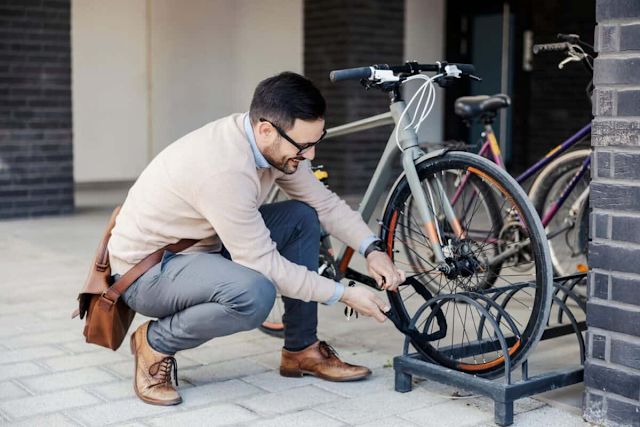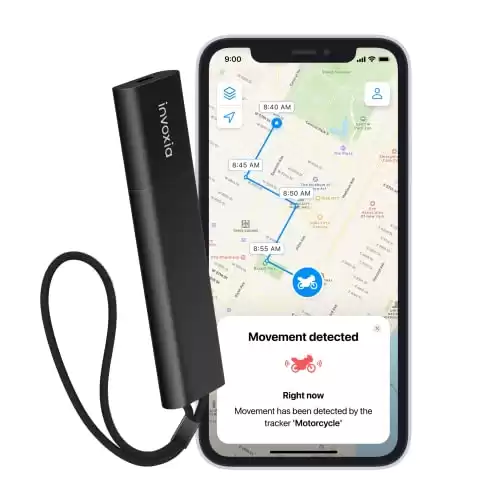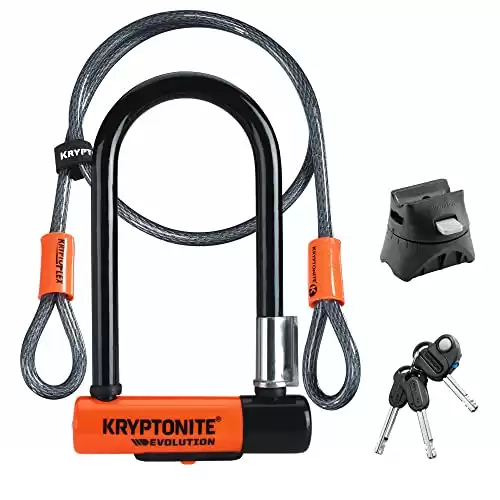
A smart bike lock is a lock that works with an app, allowing you to lock and unlock your bike without a key or combination. Smart bike locks also alert you of attempted tampering and theft.
Smart bike locks work as GPS, letting you keep an eye on the location of your bike. GPS doesn’t require Wi-Fi, so it can be a great way to keep tabs on your bike when you can’t watch it every minute it’s locked up.
While smart bike locks are excellent for bike sharing, they aren’t always the best option for daily riders. In fact, there are many reasons to avoid a smart bike lock. Let’s find out why.
Why You Should Avoid a New Smart Bike Lock
The Features Need Power
One of the neat features of a smart bike lock is the theft alarm. Cyclists will get an alert on their phones when the lock thinks it’s being tampered with, which is pretty handy on the surface.
However, it needs a battery with a charge or another power source, and an alarm is just one of the features of a smart lock that needs power. For example, some locks can alert contacts if you get into an accident. While this sounds great, the problem arises when these power-dependent features require consistent and long recharging to work.
Many features of smart locks aren’t the main reason most people buy the locks. They’re an add-on or a “nice to have.” Unfortunately, these nice-to-haves eat up the power that is needed for the necessary power-dependent features like connecting to your smartphone to unlock your bike.
While some smart bike locks do have USB or solar charging options, the fact remains that smart locks need the power to communicate with your smartphone and operate as intended.
The Batteries Need Monitoring
Because a smart bike lock needs power, the lock will need a battery. Of course, as we all know, batteries may need charging or replacing regularly. Not only do cyclists need to keep their phones charged, but they also need to ensure their smart lock battery is charged and working correctly. Most smart locks last about a year or less before needing replacement, which means you’ll have to be diligent about making sure your bike lock batteries are fresh.
Limited Bluetooth Range
If you’ve ever used a Bluetooth device, you probably know that Bluetooth doesn’t have an infinite reach. Most Bluetooth devices have a spread of about 30 feet. And, of course, buildings and environmental features can block Bluetooth, meaning the distance maybe even less. So, why is this important? Some smart bike locks need Bluetooth for many of their features, such as locking or unlocking the bike, alerts, and tracking should it be stolen. Limited Bluetooth range means you’ll only get alerts about theft if you’re within 30 feet of your bike. It also means you may want to avoid smart bike locks that rely on Bluetooth.
Dependent on Unreliable Technology
Technology of any kind can be unreliable like batteries draining unexpectedly quickly or charging cables becoming unusable. Additionally, phones can go missing, apps can fail, and connectivity can be finicky. When these things happen, suddenly our convenience isn’t so convenient anymore, and we’re left with issues instead. While some smart bike locks come with a standard key to unlock your bike should something fail, that would require you to have the key with you. And if you have to carry a key around with you anyway, why not just save money by avoiding buying a smart bike lock?
They’re Expensive
While the cost of a bike lock can be nothing compared to the price of a lost bike, smart bike locks can be much more expensive than all other locks. It’s a typical rule of thumb for cyclists to spend about 10% of their bike’s worth on a secure lock. And while that may be a good baseline, a lot of the best, most reliable smart bike locks cost upwards of $200. For most of us, that’s a lot to spend on a bike lock, especially one that may or may not be reliable.
Vulnerable to Hacking
Unfortunately, this is a bit of an inevitable risk when living in our technological world. People can hack your computer or phone, and those same hackers can also hack your smart bike lock. Traditional locks definitely don’t have this issue.

Alternatives to Smart Bike Locks
If the thought of failing, unreliable batteries in expensive devices have you questioning whether a new smart bike lock is right for you, we have some alternatives.
Bike Trackers
Invoxia Real Time GPS Tracker
- 2-year subscription with no fees
- For vehicles, cars, bikes, motorcycles
- 120-hour battery (moving) to 4 months (stationary)
- Anti-theft alerts
- Black

While some smart locks have trackers that work with GPS or Bluetooth, they aren’t ideal for deterring thefts, nor are they perfect when trying to recover a stolen bike. We don’t think it’s reliable because most thieves will simply toss a lock to the side once they get their hands on your bike. And, because the tracker tracks your lock, not your bike, you may never get your bike back. However, several types of bike trackers work with Bluetooth, GPS, or an app that is attached to your bike and can help aid in tracking it down.
The genius thing about some trackers is that they look like they’re just another part of your bike, so you can effectively hide them in plain sight. For example, you can find bike trackers that look like lights or other bike accessories or that attach to under your bike seat. Of course, these aren’t always perfect.
U-Locks
Kryptonite Evolution Mini-7 Bike U-Lock with Cable
- Made from hardened max-performance steel
- 4-foot cable to secure the front wheel
- Features a disc-detainer locking mechanism
- Very robust and easy to use

A good U-lock will fit snuggly, not leaving a lot of room for would-be thieves to wrestle a picking device or a hacksaw through it.
Bike Sharing
While not everyone lives in an area where bike sharing exists, they are a decent alternative to a smart bike lock. When you’re part of a bike share, you don’t own your bike, you rent one. You won’t have to worry about carrying a lock, smart or otherwise.
Lyft has branched out from ride-sharing to include bike sharing. The program is available in many major U.S. cities, including San Francisco and the greater Bay Area, Portland, Washington DC, New York City, Chicago, and Columbus.
With Lyft’s bike-sharing program, you can rent bikes with safety features like attached lights and built-in brakes to tour cities or just make it through your morning commute.
Register Your Bike
While all locks can help prevent theft, the sad fact is that nothing is 100% effective all the time. And, if your bike does get stolen, it can be very hard to recover. One way to help make sure you can get your property back is to register your bike with Bike Index.
Bike Index is not an alternative to a smart bike lock but rather a supplement to any bike theft prevention. Bike Index is a free registration program that uses community outreach and law enforcement partners to help you reunite with your trusty steed.
Wrapping Up
While any lock is better than no lock, we feel that smart bike locks need just a little more time on the market to work out the kinks. In the meantime, using a secure U-Lock and common sense, like locking your bike in a safe, well-lit area, will help prevent theft.




























